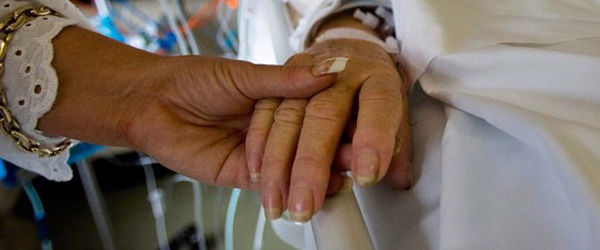Even with health reform, some people will remain uninsured, and Catholic health care must continue to be known for its "special predilection for the poor," said panelists at a Washington colloquium.
"Without that, we would have a hard time distinguishing ourselves from other not-for-profit hospitals," said Robert Stanek, retired president and CEO of Catholic Health East in Newtown Square, Pa., and current chairman of the board of trustees of the Catholic Health Association.
Corrine Parver, health policy attorney and former executive director of the health law program at American University's Washington School of Law, expressed dismay that only 60 percent of those who are uninsured today are expected to be insured by 2019, when the health reform law is fully implemented.
That situation will give Catholic hospitals "an opportunity to provide more community benefit," she said.
Jesuit Father John Haughey, a research fellow at Georgetown University's Woodstock Theological Center, focused on Catholic health care's role as a continuation of Christ's healing ministry. He said that understanding should infuse any Catholic health care institution, "from the CEO down to the one who mops the corridors."
The three speakers were part of a panel discussion during a daylong colloquium Feb. 14 at The Catholic University of America in Washington. Sponsored by the university's Institute for Policy Research & Catholic Studies and its School of Nursing, the conference had as its theme, "Learning from the Past, Planning the Future."
Reviewing changes in Catholic health care over the past few decades, Stanek said most Catholic hospitals are now part of health care systems, many of them multistate, and the number of women religious who are hospital administrators or CEOs has gone from 770 in 1968 to eight now.
As lay leadership of Catholic health care continues to grow, he said, the challenge will be to keep the systems true to their faith-based mission.
"The Catholic health ministry will be strengthened when we hold onto the concept that we are not institution-based, but based on healing, on the personal touch," Stanek said. "If our health care delivery system is truly person-centered, the Catholic ministry will be alive and well regardless of what form it takes."
He said this is the first generation of lay leaders not working side by side with women religious in Catholic health care.
Stanek said the lay leadership has progressed from saying, "Sister, tell me what to do" to asking "What would the sisters do?" But they need to continue to progress to the point of asking, "What will we do, from a perspective totally consistent with our heritage?" he said.
Saying that the "variety of rapidly emerging technologies will impact Catholic health care very strongly in the future," Stanek said he did not believe the major emphasis of health care in the future will be large acute-care hospitals.
"We can't afford as a society to continue to treat people in the most expensive vehicle possible," he said.
Parver, a member of the board of trustees of Holy Cross Hospital in Silver Spring, Md., said home- and community-based health care is the wave of the future and described some of Holy Cross' outreach programs to underserved and vulnerable segments of the population.
In addition to two health centers for uninsured adults, she said, the hospital has programs focusing on preventive care and treatment for several diseases -- including breast cancer, diabetes and heart problems.
In the policy arena, Parver expressed concern that some major employers have said they might not to continue offering health insurance to their employees under the new health reform law. In addition, she said, it is not clear where the money is going to come from for expansion of the Medicaid program, as required by the law.
Father Haughey said the major responsibility of Catholic health care institutions is to represent "Christ's healing presence, one that is sufficiently tangible with God's presence that it can ignite or reignite faith and hope and love in its patients and personnel."
He warned against a tendency toward "nostalgic piety" or to the "myopic" view that reduces "responsibility for the religious mission of the institution to the pastoral care unit."
What people should experience through Catholic health care is "more than competence, though that, more than efficiency, though that too, more than professionalism, though that too," Father Haughey said.
"It is people giving of themselves, emptying themselves to serve their brothers and sisters," he said. “If that is what is experienced in your facility, you are extending Christ's healing mission in that facility at this time."
---CNS

